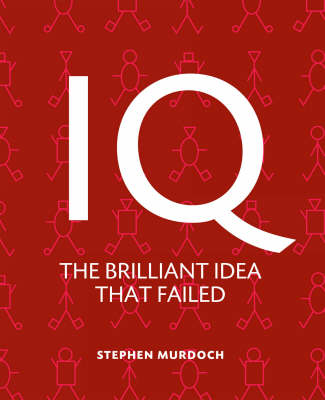
IQ: The Brilliant Idea That Failed
Seiten
2007
Gerald Duckworth & Co Ltd (Verlag)
978-0-7156-3598-8 (ISBN)
Gerald Duckworth & Co Ltd (Verlag)
978-0-7156-3598-8 (ISBN)
- Titel ist leider vergriffen;
keine Neuauflage - Artikel merken
Providing the history of the intelligence test, this title reveals how universal education, mass immigration into the US in the early 20th century and the demands of mobilisation in the First World War created the need to rank populations by intelligence.
In this, the first popular history of the intelligence test, Stephen Murdoch reveals how universal education, mass immigration into the U.S. in the early 20th century and the demands of mobilisation in the First World War created the need to rank populations by intelligence. In the following decades, the tests were used to decide whether people could settle in a new country, whether they could reproduce, even whether they lived or died. While IQ tests have some predictive power, they don't explain people's capacity to think and understand the world around them. What has only ever been a rough guide to ability has, through the seductive power of a single, all-explaining number, come to be seen as an objective and infallible measure of intelligence, even of human merit. Just as bad, we've often tried to reshape society based on exam results alone. Is that the smartest idea anyone ever had?
In this, the first popular history of the intelligence test, Stephen Murdoch reveals how universal education, mass immigration into the U.S. in the early 20th century and the demands of mobilisation in the First World War created the need to rank populations by intelligence. In the following decades, the tests were used to decide whether people could settle in a new country, whether they could reproduce, even whether they lived or died. While IQ tests have some predictive power, they don't explain people's capacity to think and understand the world around them. What has only ever been a rough guide to ability has, through the seductive power of a single, all-explaining number, come to be seen as an objective and infallible measure of intelligence, even of human merit. Just as bad, we've often tried to reshape society based on exam results alone. Is that the smartest idea anyone ever had?
Stephen Murdoch, has been working as a journalist and writer since 1999. He has contributed to Newsweek, Marketplace, The Washington Post, The Christian Science Monitor, The Washington Lawyer, The Boston Globe and other publications. Before becoming a writer, he was a human rights lawyer in Cambodia and practiced civil litigation in Washington. He lives in Santa Barbara, California with his wife and two daughters.
| Erscheint lt. Verlag | 28.6.2007 |
|---|---|
| Verlagsort | London |
| Sprache | englisch |
| Maße | 191 x 235 mm |
| Themenwelt | Geschichte ► Teilgebiete der Geschichte ► Kulturgeschichte |
| Geisteswissenschaften ► Psychologie ► Allgemeine Psychologie | |
| Geisteswissenschaften ► Psychologie ► Test in der Psychologie | |
| ISBN-10 | 0-7156-3598-0 / 0715635980 |
| ISBN-13 | 978-0-7156-3598-8 / 9780715635988 |
| Zustand | Neuware |
| Informationen gemäß Produktsicherheitsverordnung (GPSR) | |
| Haben Sie eine Frage zum Produkt? |
Mehr entdecken
aus dem Bereich
aus dem Bereich
der stille Abschied vom bäuerlichen Leben in Deutschland
Buch | Hardcover (2023)
C.H.Beck (Verlag)
23,00 €
vom Mittelalter bis zur Gegenwart
Buch | Softcover (2024)
C.H.Beck (Verlag)
12,00 €


